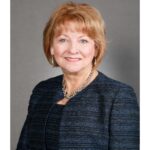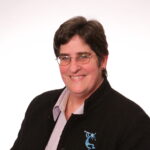During ACR Convergence 2022 in early November, the ACR and the ARP honored a group of distinguished individuals who have made significant contributions to rheumatology research, education and patient care. This month, The Rheumatologist profiles the recipients of the ARP President’s and Merit Awards.
ARP PRESIDENT’S AWARDS
The ARP president can choose to honor ACR/ARP members or teams performing outstanding service within the present year to advance the goals, ideals and standards of the ARP. This year, ARP President Barbara A. Slusher, PA-C, MSW, announced two recipients of the President’s Award, Kaleb Michaud, PhD, and Brit Donaldson, PA-C, MMS.
 Kaleb Michaud, PhD, is a professor in the Division of Rheumatology and Immunology at the University of Nebraska Medical Center, Omaha.
Kaleb Michaud, PhD, is a professor in the Division of Rheumatology and Immunology at the University of Nebraska Medical Center, Omaha.
Dr. Michaud’s experiences as a patient with a rheumatic disease have powered his passion and dedication to improving rheumatology and patient outcomes. He serves as director of FORWARD—the National Databank for Rheumatic Diseases, a long-term, open-cohort observational study with over 50,000 enrolled participants. He leads the University of Nebraska Medical Center Rheumatoid Arthritis Investigational Network (RAIN) clinical database and collaborates with the Veterans Affairs Rheumatoid Arthritis (VARA) registry, the Rheumatology Informatics System for Effectiveness (RISE) registry and others.
A scholar in pharmacoepidemiology, health informatics and cost-effectiveness, Dr. Michaud prioritizes mentoring and volunteering to grow the next generation of healers, scientists and difference-makers. Some of his current projects include disease-modifying anti-rheumatic drug (DMARD) adherence, mortality in rheumatic diseases, rheumatoid arthritis activity measures and smartphone-detected health outcomes.
Within the University of Nebraska Medical Center, Dr. Michaud is the director of the rheumatology fellowship research program, chair of the Clinical Research Center pilot grant review committee and leader of the Great Plains Institutional Development Award and Clinical and Translational Research (IDeA-CTR) Mentor Training Facilitator Team. He is dedicated to conducting research that improves care for those living with rheumatic diseases.
Dr. Michaud is an active, 20-year volunteer in the ARP and the ACR. “I am truly honored to receive this award. My volunteer journey in the ARP has been to ultimately make our rheum patients’ lives better through research, mentoring and having an organization responsive and responsible for our professionals’ needs,” says Dr. Michaud. “Being recognized like this along the way comes as a wonderful surprise!”
 Brit Donaldson, PA-C, MMS, is a physician assistant (PA) in pediatric rheumatology at Atrium Health Wake Forest Baptist, Winston-Salem, N.C. Prior to becoming a PA, she worked in a general pediatrics clinic. She became interested in rheumatology early in her training and started her PA career in adult rheumatology, but then decided to switch to pediatric rheumatology. Ms. Donaldson enjoys working with children with rheumatic conditions and their families and hopes to improve patients’ self-efficacy and help them feel supported through their experiences living with chronic conditions.
Brit Donaldson, PA-C, MMS, is a physician assistant (PA) in pediatric rheumatology at Atrium Health Wake Forest Baptist, Winston-Salem, N.C. Prior to becoming a PA, she worked in a general pediatrics clinic. She became interested in rheumatology early in her training and started her PA career in adult rheumatology, but then decided to switch to pediatric rheumatology. Ms. Donaldson enjoys working with children with rheumatic conditions and their families and hopes to improve patients’ self-efficacy and help them feel supported through their experiences living with chronic conditions.
Outside her clinical duties, Ms. Donaldson enjoys precepting and teaching. She collaborates with the Childhood Arthritis and Rheumatology Research Alliance (CARRA) registry and other research projects with her team and volunteers with the ACR/ARP on the Pediatric Rheumatology Symposium (PRSYM) Planning Committee and the Workforce Solutions Committee. Ms. Donaldson was a faculty moderator for The Training Rheum earlier this year.
Some of her professional goals are to increase rheumatology awareness and education for medical trainees and to improve training for rheumatology professionals to help ensure a sustainable workforce and support better access to care for patients.
“I am honored to receive this award. I have been extremely fortunate to have an outstanding team and supportive mentors and am very thankful for the resources the ACR provides to members and patients,” says Ms. Donaldson. ”It has been very rewarding to volunteer with the ARP/ACR and to help support training for advanced practice providers in rheumatology. I am excited for our field and allied health professionals’ roles in improving patient access and care.”
When she is not at work, Ms. Donaldson enjoys road and gravel cycling, mountain biking, hiking, camping, reading and traveling.
ARP MERIT AWARDS
The ARP Merit Awards recognize outstanding contributions to the field of rheumatology.
ARP Master Awards
The ARP’s highest honor—the Master Award—went to two ARP members in 2022 for their outstanding contributions to the field of rheumatology: Janet L. Poole, PhD, OTR/L, FAOTA, professor, University of New Mexico, Albuquerque, and Jan K. Richardson, PT, PhD, OCS, FAPTA, chief medical officer for Medical Outcome Indicators, Washington, Pa.
 Janet L. Poole, PhD, OTR/L, FAOTA, is a professor, division chief and director of the Occupational Therapy Graduate Program in the Department of Pediatrics, School of Medicine at the University of New Mexico.
Janet L. Poole, PhD, OTR/L, FAOTA, is a professor, division chief and director of the Occupational Therapy Graduate Program in the Department of Pediatrics, School of Medicine at the University of New Mexico.
Dr. Poole began working with people with arthritis very early in her career as an occupational therapist at the University of Virginia, Charlottesville. Her clinical interest in, and dedication to, people with scleroderma was fostered by Thomas Medsger, MD, and Virginia Steen, MD, at the University of Pittsburgh, Pennsylvania. She has been inspired and supported by other rheumatologists to remain committed to people with scleroderma.
As an occupational therapist, Dr. Poole is invested in the impact of scleroderma on daily life activities. She teaches rheumatology to occupational therapy students and has involved them in research projects. Dr. Poole routinely speaks at meetings of the American Occupational Therapy Association (AOTA) to educate therapists on the role of occupational therapy in scleroderma and other rheumatic conditions and was named a fellow of the AOTA and inducted into the Academy of Research for the American Occupational Therapy Foundation.
Dr. Poole has a history of productive research projects with, and funding from, the Patient-Centered Outcomes Research Institute (PCORI), the Rheumatology Research Foundation, the National Institute of Nursing Research (NINR) and the National Scleroderma Foundation, resulting in numerous publications and national and international presentations. She designed an internet-based, self-management program (Taking Charge of Systemic Sclerosis [TOSS]) and developed educational materials on hand and face exercises, management of fatigue and a program to keep people with scleroderma in the workforce. She has tried to ensure that these programs are easily accessible to patients and shares information at patient conferences. In 2011, Dr. Poole was recognized by the Scleroderma Foundation with the National Volunteer of the Year Award.
An active member of the ARP since 1984, Dr. Poole has served on numerous ARP and ACR committees as both a member and chair. Dr. Poole was the 2020 ARP president and served in officer roles as secretary, president-elect and immediate past president. Dr. Poole delivered the Distinguished Lecture at the 2018 ARP Annual Conference and received the ARP Master Educator Award in 2014 and the Master Clinician Award in 2012. She routinely presents at the ARP/ACR annual meetings.
Dr. Poole also collaborates with patients, patient groups, professional organizations and rheumatology professionals from Canada and Europe to develop educational materials and guidelines for non-pharmacological interventions for people with scleroderma.
Dr. Poole feels the ARP/ACR has provided networking and leadership opportunities that have led to a successful and enjoyable career in rheumatology. Dr. Poole received her Bachelor of Science in occupational therapy from Colorado State University, her Master of Arts from the University of North Carolina, Chapel Hill, and her doctorate from the University of Pittsburgh.
“I am so honored and humbled to receive the ARP Master Award. I am in awe of those who have received this designation in the past,” says Dr. Poole. “I have been a member of ARP for over 30 years. During this time, the ARP has afforded me so many opportunities, including networking with experts in scleroderma and other rheumatic diseases and people with scleroderma, and leadership opportunities, including being the president of the ARP in 2020. I have grown professionally, and value the long-term friendships and collaborations developed through volunteering on many different interprofessional committees and task forces.”
 Jan K. Richardson, PT, PhD, OCS, FAPTA, is chief medical officer for Medical Outcome Indicators (MOI) and professor emeritus, School of Medicine, Duke University, Durham, N.C. Dr. Richardson has also served as chief clinical officer for Universal SmartComp, Washington, Pa., as well as a professor of community and family medicine, founding chief of the Doctor of Physical Therapy (DPT) program and executive director of the Department of Physical Therapy and Occupational Therapy at Duke University Medical Center.
Jan K. Richardson, PT, PhD, OCS, FAPTA, is chief medical officer for Medical Outcome Indicators (MOI) and professor emeritus, School of Medicine, Duke University, Durham, N.C. Dr. Richardson has also served as chief clinical officer for Universal SmartComp, Washington, Pa., as well as a professor of community and family medicine, founding chief of the Doctor of Physical Therapy (DPT) program and executive director of the Department of Physical Therapy and Occupational Therapy at Duke University Medical Center.
She also served as the founding chair/professor of the DPT program, and executive director and chief executive officer for the Institute for Health Care and Research at Slippery Rock University, Pennsylvania. She has been in consulting and advisory positions with One Source, a board member of the U.S. Bone and Joint Institute representing the ACR, and serves as an expert witness. Dr. Richardson earned a doctorate and a Master of Science from the University of Pittsburgh, her post-graduate physical therapy education from the University of Pennsylvania, Philadelphia, and a Bachelor of Science from Pennsylvania State University, State College.
Active in the American Physical Therapy Association (APTA) at both the national and local levels, Dr. Richardson was APTA president, served as the U.S. delegate to the World Confederation of Physical Therapy, was a member of the executive committee of the APTA Board of Directors, and served as chair of the national TriAlliance of the APTA/American Occupational Therapy Association (AOTA)/American Speech-Language-Hearing Association (ASHA) and the American Board of Physical Therapy Specialties (ABPTS) Task Force for Specialization.
Dr. Richardson has also served as the president of the ARP and on the executive committee of the ACR. Additionally, she initiated the physical therapy component of the Global Health Outreach Initiative at Duke University, traveling to India and Kuwait in the process. She served as a volunteer with a healthcare system in western Pennsylvania and with the Western Pennsylvania Hospital Council.
Dr. Richardson has received numerous awards and honors throughout her career, including the Catherine Worthingham Fellow Award (APTA), Lucy Blair Service Award (APTA) and the Stanley Paris Award (AOPTA/APTA) and was selected nationally as an Executive Leadership in Academic Medicine Fellow (ELAM).
With her co-investigator, Chad Cook, Dr. Richardson pioneered early work in the establishment of valid and reliable scales for pain and disability. Further areas of research included validation of an item bank in community-dwelling survivors of stroke, looking into the meta-analyses of human immunodeficiency virus (HIV) treatments supported by biomedical oncology, and investigation into the use of physical therapy in patients hospitalized with a diagnosis of generalized weakness.
“I am honored to receive the Master’s designation from the ARP,” says Dr. Richardson. “The ARP has given me many opportunities throughout my career to serve in leadership positions and to contribute to the vision and goals of the ACR Association. The relationships that I have developed with colleagues have strengthened my abilities to enhance practice, advance research and foster education for the patients we serve and the profession of rheumatology.”
Lifetime Achievement Award
 Among the ARP’s highest honors is the Lifetime Achievement Award, which is presented to a current or past member who has made meaningful and lasting contributions to the field of rheumatology. This year’s award recipient is Marian T. Hannan, MPH, DSc, professor of medicine at Harvard Medical School, Boston, and a senior scientist and co-director of the Musculoskeletal Research Center at the Hinda & Arthur Marcus Institute for Aging Research at Hebrew Senior Life, Boston, as well as a former president of ARP (then known as ARHP) in 1998–99.
Among the ARP’s highest honors is the Lifetime Achievement Award, which is presented to a current or past member who has made meaningful and lasting contributions to the field of rheumatology. This year’s award recipient is Marian T. Hannan, MPH, DSc, professor of medicine at Harvard Medical School, Boston, and a senior scientist and co-director of the Musculoskeletal Research Center at the Hinda & Arthur Marcus Institute for Aging Research at Hebrew Senior Life, Boston, as well as a former president of ARP (then known as ARHP) in 1998–99.
Dr. Hannan has been an ARP member since 1988 and has enjoyed parallel growth of her career along with growth within the ARP.
“I am incredibly honored to receive the ARP Lifetime Achievement Award, especially as the ARP is my professional home and a community chockful of incredible, dedicated people,” says Dr. Hannan.
“I have spent a ‘scientific lifetime’ in the ARP/ACR, presenting talks, helping on committees, serving as editor of Arthritis Care & Research and giving my all to our organization. Rheumatology is a team sport, and I am fully grateful to every player, coach, talent scout, advisor and sponsor (thank you RRF [Rheumatology Research Foundation]!) for the honor of our play over the years.”
For a decade earlier in her career, Dr. Hannan worked with the Boston University Arthritis Center, and over the past 25 years she has conducted research at the Marcus Institute.
Dr. Hannan conducts research focused on osteoarthritis, foot biomechanics, fractures and osteoporosis. She is widely published, with more than 200 articles presented in over 50 scientific journals in the medical field, including Arthritis Care & Research, The New England Journal of Medicine, Arthritis & Rheumatology and the Journal of Bone & Mineral Research.
She has been the principal investigator on a number of National Institutes of Health (NIH) grants and has had continuous NIH grant funding since 1996. She collaborates closely with investigators in Boston, using the combined expertise of bioengineers, rheumatologists, nutritional epidemiologists, geneticists, molecular biologists and statisticians to quantify risk factors contributing to musculoskeletal diseases. Dr. Hannan reviews grant applications nationally and internationally.
At Harvard Medical School, Dr. Hannan teaches clinical epidemiology and population health to first-year medical students. She also lectures in the school’s geriatrics fellowship program. Dr. Hannan is the course director of the Frailty Course at Harvard School of Public Health. Her mentoring of young investigators includes many scientists and medical fellows in the Boston area, as well as early stage investigators across the U.S. and Canada through the U.S. Bone & Joint Initiative’s Young Investigator Initiative. One of her great joys is mentoring young researchers as they grow their careers. She is an award-winning mentor and enjoys contributing to the next generation of innovative medical research.
Dr. Hannan received her undergraduate degree at the University of California, Berkeley, a Master of Public Health at Yale University School of Medicine, New Haven, Conn., and a doctorate in epidemiology at Boston University School of Medicine.
“We all stand on the shoulders of giants in our field,” Dr. Hannan notes, and she offers her heartfelt thanks to ARP/ACR members from whom she has learned so much about science and received helpful feedback. Most importantly, she applauds the combined efforts within the ACR that have brought rheumatology research forward.
Addie Thomas Service Award
 The 2022 Addie Thomas Service Award is presented to an ARP member in honor of the Association’s first president and recognizes active volunteers in arthritis-related activities. This year’s recipient is Charles G. Helmick, MD.
The 2022 Addie Thomas Service Award is presented to an ARP member in honor of the Association’s first president and recognizes active volunteers in arthritis-related activities. This year’s recipient is Charles G. Helmick, MD.
Dr. Helmick graduated in 1972 from the University of Michigan, Ann Arbor, and in 1976 from the Johns Hopkins School of Medicine, Baltimore. After training in internal medicine, he joined the Epidemic Intelligence Service (the disease detective training program) at the Centers for Disease Control and Prevention (CDC). There he worked on exotic infectious diseases in international settings before switching his focus to chronic diseases as the bigger health problem. Dr. Helmick worked part time in the Atlanta VA Rheumatology Clinic for 12 years, where he learned more about rheumatic diseases firsthand. He retired as a captain in the U.S. Public Health Service in 2009 and from the civil service with the CDC in 2021.
When Dr. Helmick’s effort to address aging-related problems got little traction at the CDC in the early 1990s, he switched his focus to the most salable of those public health problems—arthritis. Working with former ARHP President Teresa Brady, the Arthritis Foundation, the ACR/ARHP and other partners, he helped develop the National Arthritis Action Plan: A Public Health Strategy. This document provided support for Congress’ first funding for the CDC’s Arthritis Program in 1999.
Since then, the CDC Arthritis Program has worked to provide basic and more advanced national-, state- and county-level measures of the public health impact of arthritis and other rheumatic conditions and to raise their visibility as health problems. The program also worked to develop and promote evidence-based but underused interventions, such as self-management education and physical activity, reaching hundreds of thousands of adults with arthritis.
He also worked to do the same for lupus by establishing registries in 2003 across the U.S. Because pain is a key symptom of these conditions, later in his career he began to work with national organizations to address pain as a major public health issue and arthritis as a major cause of pain. Arthritis and (separately) pain are now addressed in key national planning documents, such as the U.S. Department of Health and Human Services’ Healthy People objectives.
Dr. Helmick has been a member of the ARP since 1996, worked closely with many ARP leaders over the years and received multiple ARP awards. He was a member of the Arthritis Care & Research Editorial Board and continues as a longtime contributor to the journal. He worked to make the ARP the national home for public health science and intervention activities that address arthritis and other rheumatic conditions.
Dr. Helmick says, “The ARP is the perfect place to work on bridging the clinical-community gap in health and to achieve what we all want—better health and quality of life for people affected by arthritis and other rheumatic conditions. The population burden and individual impact of arthritis and rheumatic conditions is under-recognized in the United States. For me this award helps recognize those of us who have worked to change that by focusing on the big picture and communicating it more widely.”
Ann Kunkel Advocacy Award
The 2022 Ann Kunkel Advocacy Award, recognizing an ARP member who has provided extraordinary service in advocating for patients with arthritis and rheumatic diseases or for health professionals in rheumatology, was presented to Ms. MacQueen graduated from the University of Western Ontario, London, in 1980 with a BScPT degree and worked at Grand River Hospital, Kitchener, Ontario, as staff physiotherapist until 1988 when she started working with the Arthritis Society’s Arthritis Rehabilitation and Education Program (AREP) in Kitchener.
She has been active in the assessment and management of people living with arthritis and has developed and presented education programs for people with different types of arthritis and for healthcare professionals who wish to enhance their competency in arthritis care.
In 2009, she completed the Advanced Clinician Practitioner in Arthritis Care (ACPAC) program through the University of Toronto and St. Michael’s Hospital. She provided ACPAC support in the pediatric rheumatology clinic at Children’s Hospital, London, Ontario, and for local physicians and rheumatologists in Guelph and Kitchener-Waterloo from 2009 until 2021. Her passion has been the development of models of care that improve timely and appropriate access to care for people living with arthritis.
Ms. MacQueen has been a member of the Arthritis Health Professions Association (AHPA) for over 33 years and served as president of the organization 2018–20 during which time she was focused on the development of a strategic plan and promoting collaboration with the Canadian Rheumatology Association, the Ontario Rheumatology Association and the ARP. She was awarded the AHPA Extraordinary Service Award in 2021 and the AHPA Lifetime Achievement Award in 2022.
In 2022, Ms. MacQueen was awarded the Leadership and Advocacy Award by the Ontario Physiotherapy Association and recently received a Kitchener-Waterloo Oktoberfest Woman of the Year Award for her professional activities. A proud member of the ARP, Ms. MacQueen has participated in annual meetings and Pediatric Rheumatology Symposiums (PRSYMs) since the 1990s.
“It is a great honor to receive the Ann Kunkel award for advocacy. So many of my colleagues work tirelessly, not only to advocate for their patients, but also within our professions, to create system changes that will improve access to care for people living with arthritis. It is humbling to have been nominated for this award by my peers—people I admire and strive to emulate,” says Ms. MacQueen.
Ms. MacQueen recently retired from the Arthritis Rehabilitation and Education Program of the Arthritis Society and is enjoying her new role as proud grandma to three wonderful granddaughters.
Distinguished Scholar Award
 The 2022 Distinguished Scholar Award was presented to Aileen Davis, BScPT, MSc, PhD, for her exceptional achievements in scholarly activities pertinent to arthritis and rheumatic diseases. Dr. Davis is professor emeritus, University of Toronto, Ontario.
The 2022 Distinguished Scholar Award was presented to Aileen Davis, BScPT, MSc, PhD, for her exceptional achievements in scholarly activities pertinent to arthritis and rheumatic diseases. Dr. Davis is professor emeritus, University of Toronto, Ontario.
Dr. Davis’s primary research focus is musculoskeletal disease, particularly in identifying modifiable predictors of patient outcomes. She has extensive experience in outcome measure development and evaluation and has published and lectured extensively on various aspects of patient evaluation and outcomes in arthritis. Her research has focused on models of care for osteoarthritis (OA), including the development, implementation and evaluation of care pathways to improve access to services for people having total hip or knee replacement, and implementation and evaluation of evidence-based, non-surgical management for people with hip and knee OA.
“I’m extremely honored to be recognized by my peers in the ARP and selected for this award. I’ve been a member and volunteer with the ARP for many years and this involvement has afforded me the opportunity to meet and collaborate with so many talented members. The ARP community plays a critical role in advocating for and conducting research to improve care and outcomes for people with arthritis,” says Dr. Davis.
“It is a privilege to have the opportunities afforded by involvement with the ARP and to receive this award in acknowledgment of my contributions to this role of the ARP. These clinical and research accomplishments would not have been possible without the mentorship and collaboration of my many colleagues, collaborators, trainees and staff, and this award is a testament to their support,” she adds.
Dr. Davis trained as a physiotherapist and clinical epidemiologist, receiving her doctorate from the University of Toronto. She was a senior scientist and division head, Division of Health Care and Outcomes Research, Krembil Research Institute, Toronto, and an investigator with the Arthritis Community Research and Evaluation Unit at University Health Network, Toronto.
She continues her academic appointment at the University of Toronto in the Departments of Physical Therapy and Surgery and holds full membership in the School of Graduate Studies in the Rehabilitation Science Institute, Institute of Health Policy, Management and Evaluation, Dalla Lana School of Public Health, and the Institute of Medical Science.
She is a past member of the Musculoskeletal Health and Arthritis Advisory Board of the Canadian Institutes of Health Research, Ottawa. She also is the past chair of the Scientific Advisory Committee, a member of the board of The Arthritis Society, co-chair of Bone and Joint Canada and director of their Osteoarthritis Initiatives and a member of the board of the Osteoarthritis Research Society International. She also was an associate editor for Osteoarthritis and Cartilage for six years.
A longstanding member of the ARP, Dr. Davis served two terms as the ARP representative on the Quality Subcommittee, three terms on the Editorial Board of Arthritis Care & Research and is currently a member of the Committee on Journal Publications.
Distinguished Clinician Award
The ARP Distinguished Clinician Award is presented to an ARP member who is engaged in clinical practice and demonstrates outstanding clinical expertise in arthritis and the rheumatic diseases. This year two people are receiving the award: Adena Batterman, LCSW, MSW, and Heather Benham, DNP, APRN, CPNP-PC.
 Adena Batterman, LCSW, MSW, is a licensed clinical social worker and senior manager of the Inflammatory Arthritis Support and Education Programs in the Department of Social Work Programs at the Hospital for Special Surgery, New York City. She earned a Master of Social Work from Silberman School of Social Work, Hunter College, New York City.
Adena Batterman, LCSW, MSW, is a licensed clinical social worker and senior manager of the Inflammatory Arthritis Support and Education Programs in the Department of Social Work Programs at the Hospital for Special Surgery, New York City. She earned a Master of Social Work from Silberman School of Social Work, Hunter College, New York City.
“I am honored and humbled to receive the ARP Distinguished Clinician Award. Being recognized by my peers and colleagues is a high honor,” says Ms. Batterman.
“My volunteer work on ARP Committees, projects and participation in Annual Meetings over the past 20 years has provided many opportunities to learn from passionate, engaged rheumatology professionals from many disciplines. These experiences have expanded my thinking and perspective, helped me discover new directions in my work and have made me a better clinician and researcher. I deeply appreciate and value these relationships and the mentorship I’ve experienced through the ARP and the ACR,” she adds.
Throughout her 27-year career in healthcare, Ms. Batterman’s clinical, program and research work has focused on supporting and enhancing patients’ ability to cope with the physical and emotional impact of chronic illness. Since 1999, Ms. Batterman has developed and continues to provide strategic oversight to innovative patient-focused support and education programs for people with inflammatory arthritis. These vital forums provide camaraderie for, and a community where people with inflammatory arthritis and their loved ones can learn about inflammatory arthritis management while processing its emotional impact. Ms. Batterman’s work focuses on integrating patient perspective into program development and research via focus groups, needs assessments and patient partner input.
To address health disparities in Hispanic rheumatoid arthritis (RA) patients, Ms. Batterman is currently overseeing the development of a culturally tailored, bilingual (i.e., Spanish/English) support and education pilot. This program’s approach will incorporate input from Latinx patients with RA, building on evidence-based, culturally tailored outreach and self-management strategies.
Ms. Batterman has served as co-investigator on multiple research initiatives that emphasize patient perspective, including the development of a self-management mobile app for people with lupus and identifying the relevance of Patient Reported Outcomes Measurement Information System (PROMIS) items in systemic lupus erythematosus, as well as principal investigator on studies concerning the self-management needs of people with gout, and the development of a program evaluation tool for an early RA support and education program.
She is currently serving as co-investigator on two qualitative studies: exploring the psychological experience of work for people living with inflammatory arthritis, and the support and education needs of Latinx/Hispanic patients with RA.
Ms. Batterman has also supported the professional growth of social work students and colleagues through individual and peer group supervision and presentations on an integrative biopsychosocial approach to working with patients who have inflammatory arthritis. She has also presented professional educational content for ACR/ARP annual meetings over the past 20 years, including the 2018 Daltroy Memorial Lecture: Healer, Know Thy Patient (and Thyself): What Matters in Patient-Provider Relationships? Values, Attitudes and Beliefs. Most recently, Ms. Batterman authored a new module in the Fundamentals of Rheumatology Course (FRC), titled “Addressing Psychosocial Issues in Rheumatic Illness.”
Ms. Batterman has served the ARP in multiple roles and committees over the past 10 years, including as member of the Practice Committee, Executive Committee, liaison to the Committee on Education and, most recently, as chair-elect of the eLearning Subcommittee.
 Heather Benham, DNP, APRN, CPNP-PC, has been a certified pediatric nurse practitioner in the Rheumatology Department at Scottish Rite for Children, Dallas, for nearly 20 years. She received her Doctor of Nursing Practice and Master of Science in Nursing from the Frances Payne Bolton School of Nursing at Case Western Reserve University, Cleveland.
Heather Benham, DNP, APRN, CPNP-PC, has been a certified pediatric nurse practitioner in the Rheumatology Department at Scottish Rite for Children, Dallas, for nearly 20 years. She received her Doctor of Nursing Practice and Master of Science in Nursing from the Frances Payne Bolton School of Nursing at Case Western Reserve University, Cleveland.
She is a member of the Childhood Arthritis and Rheumatology Research Alliance (CARRA), where she is the research coordinator for the CARRA registry and is active in the Musculoskeletal Ultrasound Workgroup. She holds certification in musculoskeletal ultrasound through the ACR.
Dr. Benham loves to interact with her patients and families through the use of bedside ultrasound, both for diagnostic and interventional purposes. She has also developed a musculoskeletal ultrasound curriculum for the pediatric rheumatology fellows at her institution.
“I am very honored to be receiving the ARP Distinguished Clinician award. I have been working as a nurse practitioner in pediatric rheumatology for nearly 20 years and it is wonderful to be honored for the clinical work for which I am so passionate,” says Dr. Benham. “I owe much of my success to the team I work with on a daily basis and the patients and families who continue to amaze me with their resilience.”
As a member of the ARP, Dr. Benham has served as the ARP representative to the Committee on Rheumatologic Care, as well as serving on the ARP Practice Committee, the ACR/ARP Annual Meeting Planning Committee and the Nurse Practitioner/Physician’s Assistant Curriculum Task Force. She currently is the ARP representative to the Pediatric Rheumatology Collaborative Study Group (PRCSG) and the ARP representative to the Rheumatology Research Foundation Impact Advisory Council.
Dr. Benham’s conference presentations include A Swollen Joint: The Nuts and Bolts of Pediatric Rheumatology, 2014 Regional CME Conference, Texas Academy of Physician Assistants; Update on the Treatment of Juvenile Idiopathic Arthritis, 2015 Conference on Pediatric Health Care, National Association of Pediatric Nurse Practitioners; The Use of Ultrasound Guided Steroid Injections in the Treatment of Juvenile Idiopathic Arthritis ( JIA), Pre-Brandon Carrell Conference, Texas Scottish Rite Hospital, June 2016; and A Swollen Joint: An Overview of Juvenile Idiopathic Arthritis ( JIA) and Related Conditions, Pediatric Orthopaedic Practitioners Society Annual Conference, May 2018. She has numerous publications to her name and has served as the Scottish Rite study coordinator for research trials.
Distinguished Educator Award
 This year’s Distinguished Educator Award was presented to Linda Li, PT, PhD, for demonstrating excellence in teaching patients and students/trainees. Dr. Li is a professor and Harold Robinson/Arthritis Society Chair in the Department of Physical Therapy, University of British Columbia, Vancouver, and senior scientist at Arthritis Research Canada, Vancouver.
This year’s Distinguished Educator Award was presented to Linda Li, PT, PhD, for demonstrating excellence in teaching patients and students/trainees. Dr. Li is a professor and Harold Robinson/Arthritis Society Chair in the Department of Physical Therapy, University of British Columbia, Vancouver, and senior scientist at Arthritis Research Canada, Vancouver.
“I am extremely honored to be selected for this award. My work focuses on patient-oriented research and there is nothing more gratifying than seeing our students collaborate and co-produce research with patients. This award is shared with all the patient partners who have so generously given their time, expertise and lived experiences for educating a generation of researchers in patient-oriented rheumatology research,” says Dr. Li.
“As a pioneer in engaging patients as research partners, Arthritis Research Canada provides an unparalleled environment for me to grow as a researcher and an educator. I am also grateful for the important support of the University of British Columbia,” she adds.
Dr. Li’s research in knowledge translation and implementation science centers on strategies to improve the care of people with arthritis and to support patient self-care. Her work focuses on the integration of online, mobile and wearable tools to improve clinical practice. An example includes physical activity counseling by physical therapists with the use of wearables and apps. The latter includes OPERAS (On-demand Program to EmpoweR Active Self-management), an award-winning self-monitoring app co-designed with and for people with rheumatoid arthritis.
Dr. Li’s work in integrated knowledge translation has led to a new line of studies on the benefits of engaging patients in the research process. Since 2014, she has mentored trainees to study the experiences of patients as research partners and examined the benefits and risks of being research partners from a patient perspective. The results highlight important elements of a mutually beneficial partnership between patients and researchers, and subsequently inform two new products: 1) a conceptual framework of meaningful patient engagement in research, and 2) an outcome measure for evaluating the quality of patient engagement. Many of Dr. Li’s mentees have built successful careers in knowledge translation and implementation research (in academia) and practice (in health authorities and research centers).
Dr. Li’s work has been recognized with several awards, including the Michael Smith Health Research BC (British Columbia) Career Investigator Award and a Canada Research Chair in Patient-Oriented Knowledge Translation. She was selected for the ARP Distinguished Scholar Award in 2015. In 2019, she was inducted as Fellow of the Canadian Academy of Health Sciences.
Outstanding Student in Rheumatology Award
The ARP Outstanding Student in Rheumatology Award seeks to recognize students advancing rheumatology in one or more of the following areas: education, practice, research and/or advocacy, and is open to non-physician health professional students who have not yet achieved the highest academic degree in a given field of study. Two people received the award this year: Thomas Bye, PT, DPT, MS, a licensed physical therapist and PhD student at the University of Delaware, Newark, and Hannah Peterson, PharmD, a pharmacy practice resident at Methodist University Hospital, Memphis, Tenn.
 Thomas Bye, PT, DPT, MS, received a Bachelor of Science in exercise science in 2018 and a Master of Science in kinesiology in 2019, both from Michigan Technological University, Houghton, and a doctorate in physical therapy from the University of Delaware in 2021, where he is beginning work as part of a dual doctor of physical therapy and doctorate in biomechanics and movement science degree program.
Thomas Bye, PT, DPT, MS, received a Bachelor of Science in exercise science in 2018 and a Master of Science in kinesiology in 2019, both from Michigan Technological University, Houghton, and a doctorate in physical therapy from the University of Delaware in 2021, where he is beginning work as part of a dual doctor of physical therapy and doctorate in biomechanics and movement science degree program.
His interests span from clinical practice in orthopedics and older adults to human performance and space physiology. His current research with osteoarthritis, physical activity, sedentary behavior and functional outcomes is part of the Delaware ACTIVE lab, directed by his mentor, Daniel K. White, ScD. Last year, Dr. Bye and his colleagues at the university presented research that demonstrated the Hawthorne effect when monitoring physical activity of adults with knee osteoarthritis.
Dr. Bye is a member of the ARP Practice Committee and integrative treatment clinical practice guidelines review team, which aims to improve non-pharmacological treatment of rheumatoid arthritis and improve interdisciplinary practice for patients with rheumatic diseases. Additionally, he is currently a mentee in the Rheum with a (re)View initiative preparing to conduct journal reviews.
“I am grateful for the opportunities and work that I have taken part in at the ARP, and the Outstanding Student award is humbling. I am very excited to continue researching and supporting my peers and patients,” says Dr. Bye.
 Hannah Peterson, PharmD, received her Doctor of Pharmacy from Lipscomb University College of Pharmacy, Nashville, in 2022, and is currently in her pharmacy practice residency at Methodist University Hospital. While at Lipscomb, Dr. Peterson was selected as a participant in the prestigious Vanderbilt Program of Interprofessional Learning, which brings together pharmacy, medical, nursing and counseling/social work students. She also served as a pharmacy intern at Monroe Carell Jr. Children’s Hospital at Vanderbilt, Nashville.
Hannah Peterson, PharmD, received her Doctor of Pharmacy from Lipscomb University College of Pharmacy, Nashville, in 2022, and is currently in her pharmacy practice residency at Methodist University Hospital. While at Lipscomb, Dr. Peterson was selected as a participant in the prestigious Vanderbilt Program of Interprofessional Learning, which brings together pharmacy, medical, nursing and counseling/social work students. She also served as a pharmacy intern at Monroe Carell Jr. Children’s Hospital at Vanderbilt, Nashville.
While exploring areas of interest during pharmacy school, Dr. Peterson was intrigued by the love and passion Kam Nola, PharmD, MS, FAPhA, professor and chair of the Department of Pharmacy Practice at Lipscomb University College of Pharmacy and Health Sciences, has for rheumatology. She sought out research opportunities in this field and was introduced to Anna Patrick, MD, PhD, assistant professor of pediatrics and rheumatology, Vanderbilt University.
“Receiving the Outstanding Student in Rheumatology award means a lot to me as it is a great accomplishment in my early professional career and reflects my passion and dedication to my research in juvenile idiopathic arthritis,” says Dr. Peterson.
“I was first introduced to involvement in rheumatology with Dr. Kam Nola, who deservingly won last year’s ARP Distinguished Educator Award. I was then introduced to Dr. Anna Patrick, with whom I have been conducting research in juvenile idiopathic arthritis ( JIA) for the last two years. Through this project we hoped to develop electronic health record algorithms that continue to facilitate research in JIA. It is highly rewarding to see our work further recognized and appreciated through this award,” she adds.
“Although I currently am undecided about plans for after residency and specialization, I hope that involvement in rheumatology, whether through practice, research or volunteering, is in my future,” Dr. Peterson says.
Patrice Fusillo is a writer and editor based in Oakland, Calif.



